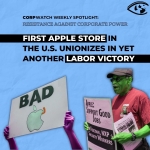INDIA: Camera Obscura and the manufacture of happiness
Camera Obscura and the manufacture of happiness
An advertisement flooding airwaves across the country would have you believe that a company called Vedanta is a creating a product called happiness. A young child called "Binno" plays, studies, and thinks big dreams in one of India's lusher and more idyllic villages. Binno's joy, the voice-over says, is relatively recent: Binno's parents probably didn't have as much fun or as many dreams as Binno does.
Binno's parents don't dispute the claims, but it is safe to assume that they certainly didn't have ad-firm Ogilvy and Mather on hand to film their childhood as part of the first national campaign to signal the entry of controversial mining and metals giant Vedanta into the happiness market.
London-based Vedanta Resources is the holding company for a host of Indian and international companies like BALCO, Vedanta Aluminum, Sterlite, Sesa Goa, and Cairn India Ltd with annual revenues in excess of $11 billion. The company's rapid expansion has attracted the ire of environmental activists and human rights groups like Amnesty International who have accused the company of exploiting indigenous communities - such as the Dongria Kondhs of Niyamgiri in Odisha - without due process.
The company is also involved in litigation over a proposed university in Odisha, and a separate case in Chhattisgarh in which 45 labourers were killed in a construction accident in their BALCO plant in Korba. Company spokespersons have denied such allegations and say that the company has improved the lives of thousands of individuals through employment and social initiatives implemented by the Vedanta Foundation.
Telling its side of the story
Vedanta's "Creating Happiness" campaign, according to company spokesperson Senjam Raj Sekhar, is part of an "initiative to tell our side of the story"; yet the hostile reception on blogs and social-media networks like Facebook and Twitter highlights the risks of exposing a tightly controlled corporate message to the anarchy of the internet.
Case in point: The television commercial starring Binno is merely the launch pad of the campaign, which also includes a film competition, in which media and mass communication students from 21 institutions across the country were invited to make three-minute films on the company's various Corporate Social Responsibilty projects. An online campaign appears to have influenced film director Shyam Benegal and film artiste Gul Panag's decision to withdraw from the competition jury.
Activists have even started a viral "Faking Happiness" campaign in an attempt to highlight Vedanta's alleged malpractices.
In conversations with The Hindu, Ms Panag described her decision to withdraw as a "matter of personal choice ...when I found myself in a position other than what I thought I had committed to," but appeared more outspoken on Twitter, tweeting "My bad. Just got full details. I wasn't aware that the competition was past of #vedanta glorification/PR Have pulled out [sic]."
"Initially I said yes and then it struck me that I hadn't thought of it as Vedanta, just as a short films competition," said Mr. Benegal in an interview, adding that "They are very nice films," but he withdrew "the moment I saw this was the kind of thing they were asking us to judge."
With Mr. Benegal and Ms Panag's withdrawal, only O&M's Piyush Pandey - the maker of the Binno ad - is left of the original three-member jury. Vedanta refuses to reveal their replacements.
Vedanta representatives describe the competition as an example of "social media in the true sense," where students were assigned community initiatives on the basis of their geographic proximity to Vedanta projects, and asked to engage with the communities they covered. Mr. Sekhar, the Vedanta spokesperson, said that company representatives made presentations to each student group and discussed a broad range of issues.
"We told them do not make a corporate film," Mr. Sekhar said, "find the story of either an individual or a family or the entire village or the community whose lives have changed...so it's not about the programme but about individuals."
The films themselves are student productions showcasing a variety of CSR initiatives such as hospitals, football academies, company run schools, rural entrepreneurs and anganvadis. Yet, none of the films explore themes such as ecological damage or the impact of mining on forest communities. The sole film to address the issue of rehabilitating project-affected individuals describes Vedanta as a "path-breaking leader of social upwardness [sic]" that has rescued "the lives of tribals from the darkness of backwardness."
While there is no reason to doubt Vedanta's claims that students were free to pick their own unique perspectives for their films, the structure of the competition could have influenced the kind of films that were made. According to the website, Vedanta provided all the travel, logistics and accommodation for the students, a local Vedanta team was present during each shoot, and students were not allowed to upload or share their work before the films were first uploaded by Vedanta on its official YouTube channel. Students were disallowed from using any stock footage for their projects, which would have made it impossible to incorporate news reports or footage shot by activists.
Vedanta representatives said they were happy with the campaign, claiming that it has attracted more than one lakh views on YouTube and that the company is fielding calls from individuals interested in working with the Vedanta Foundation. Yet, the campaign could fall victim to the network virality that it hopes to harness. While few expect companies to spend money on producing balanced, unbiased and fair advertising campaigns, viewers expect "film competitions" that feature "real people" in "real situations" to adhere to certain broadly defined standards of neutrality. At present, one suspects that the winning entry shall be the one that shows Vedanta in the best light.
- 116 Human Rights


